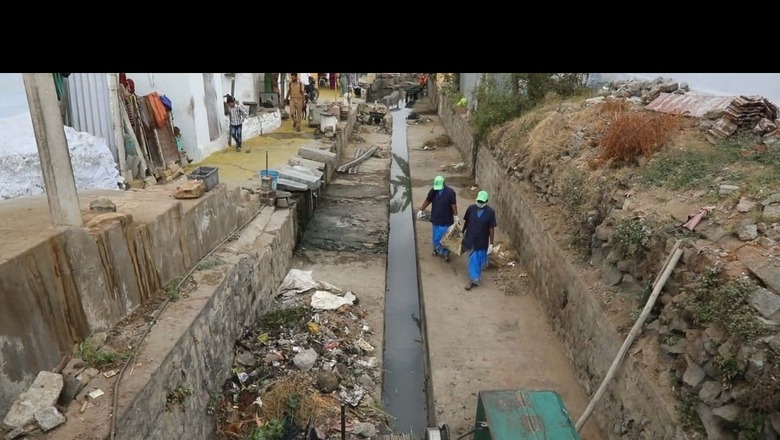
views
Sanitation is a vital service that affects the health, dignity and well-being of billions of people worldwide. However, it is also a sector that is often neglected, stigmatised and underfunded. These challenges are even more acute for women sanitation workers, who have to deal with gender-based violence, harassment and discrimination, as well as the double burden of domestic and paid work.
Fortunately, this is changing. Numerous NGOs and grassroots organisations are working hard to dispel these attitudes and mindsets. Harpic, as India’s leading brand in the lavatory care segment has a deep and nuanced understanding of the challenges women sanitation workers face, and particularly so, of those who hail from lower castes. With an aim to lift these women from the morass of poverty, exploitation and stigma, Harpic founded the Harpic World Toilet College (HWTC) in 2016.
HWTC was established with the stated objective of improving the quality of life of sanitation workers through their rehabilitation by linking them with dignified livelihood options. Workers trained by the college are provided placement with various organisations. Following the successful proof of concept in Rishikesh, HWTCs have opened in Maharashtra, Aurangabad, in partnership with Harpic, Jagran Pehel and Maharashtra Government.
In India, organisations like HWTC have been at the forefront of transforming the lives of sanitation workers. Through training, support, and empowerment, these initiatives are driving change and helping these workers break free from the shackles of poverty and discrimination. Let’s delve into four inspiring stories from the four corners of India that illustrate the profound impact of organisations like HWTC and the resilience of sanitation workers.
Laxmi Naik: East India
Laxmi Naik, hailing from Cuttack in East India, represents the strength and determination of women sanitation workers. Married at an early age, Laxmi and her husband struggled to make ends meet as they worked as sanitation workers for Cuttack Municipal Corporation. Financial difficulties and the expensive city life took a toll on their family.
In 2020, the Garima Scheme was launched by the state government, aiming to ensure economic safety and social dignity for core sanitation workers. During a survey, officials from Cuttack Municipal Corporation discovered Laxmi earning a modest income from cleaning public toilets. They counselled her and provided training on operating a cesspool vehicle. With newfound skills and determination, Laxmi transitioned from an unskilled manual toilet cleaner to a high-skilled cesspool vehicle operator. She now earns three times more than her previous income, breaking free from the cycle of poverty.
Laxmi Vijay Ghodke: West India
Laxmi Vijay Ghodke’s story resonates with countless women sanitation workers in India’s western region. For eight long years, she cleaned public toilets without respite or acknowledgment, all while enduring deplorable conditions and the absence of safety equipment. Her dedication to providing for her family, despite the hardships, was unwavering.
Then came her opportunity for transformation through Harpic World Toilet College. After training, Laxmi secured a position at MGM Hospital, Aurangabad, and her life took a remarkable turn. Her dedication and hard work were quickly recognized, propelling her to the position of supervisor—the first woman to achieve this at the hospital. Her family, especially her children, now proudly boast of her accomplishments. Laxmi’s journey from a sanitation worker to a hospital supervisor is a testament to the impact of education and opportunity.
Venkatalakshmi: South India
Venkatalakshmi, hailing from Andhra Pradesh’s Narsapur, overcame formidable obstacles to become a thriving entrepreneur in the sanitation sector. Her tribal background and gender initially limited her employment opportunities. Her husband, who owned a desludging truck, fell ill due to excessive alcohol consumption, compelling her to take up the family business.
With unwavering determination, Venkatalakshmi took a loan to expand the family business, operating desludging trucks. She defied societal norms and scepticism, ultimately earning respect for her dedication and competence. Today, she owns and operates three desludging trucks, with full support from her family and recognition from the municipal corporation. Venkatalakshmi’s journey exemplifies the power of determination and the impact of involving women in sanitation businesses.
Usha Chaumar: North India
Usha Chaumar’s remarkable journey epitomises the resilience of sanitation workers in North India. She began her career as a toilet cleaner in Alwar, Rajasthan, at just seven years old. Despite the challenges of her work being labelled “dirty,” Usha’s unwavering determination and the support of Sulabh International enabled her to become a beacon of change.
Today, Usha leads the Sulabh International Social Service Organisation, advocating for better working conditions and pay for sanitation workers. Her efforts have uplifted countless women out of poverty and inspired her own family’s advancement. Her son now pursues a postgraduate degree—a testament to the choices she made. Usha’s journey embodies the transformative power of education, empowerment, and resilience.
Conclusion
The stories of Laxmi Naik, Laxmi Vijay Ghodke, Venkatalakshmi, and Usha Chaumar are just a few examples of the profound impact that organisations like Sulabh International and Harpic World Toilet College have had on the lives of sanitation workers across India.
By empowering women sanitation workers, these initiatives are not only breaking the cycle of poverty but also challenging societal norms and stereotypes. They are paving the way for a brighter, more equitable future where sanitation workers are recognized, respected, and rewarded for their essential contributions to society.
Of course, Harpic is doing much more to amplify the impact of these wins. Joining hands with News18, Harpic created Mission Swachhta aur Paani, a movement that champions the cause of inclusive sanitation, equality for all genders, abilities, castes and classes and the strong belief that clean toilets are a shared responsibility.
Mission Swachhta aur Paani leverages News18’s vast reach to get these stories of hope and inspiration out to the wider masses. As these initiatives expand their reach and impact, there is hope that many more sanitation workers will have the opportunity to transform their lives, just like Laxmi, Laxmi, Venkatalakshmi, and Usha did. In doing so, they not only elevate themselves but also contribute to the broader goal of improving sanitation and hygiene standards across India.
We need you to be a part of the solution too. Join us here, to learn more about the small, everyday actions you can take to make a difference in the lives of these women. Of course, should you want to go further and take bigger actions, we’ve got all the information you’ll need to do so. Together, let’s make a Swasth and Swachh Bharat for everyone.



















Comments
0 comment